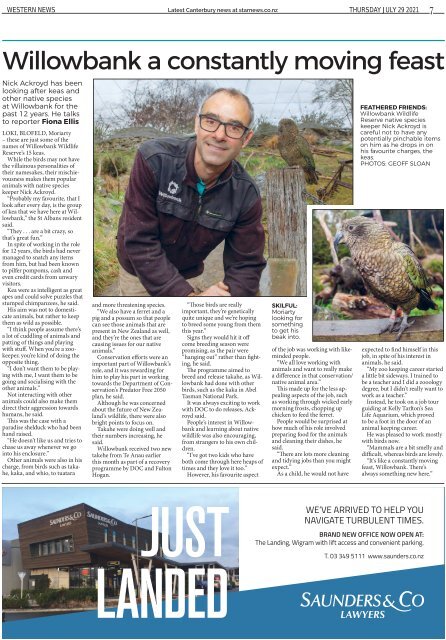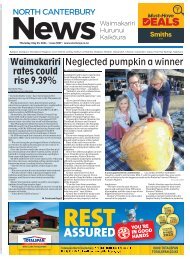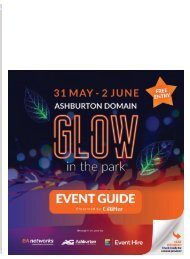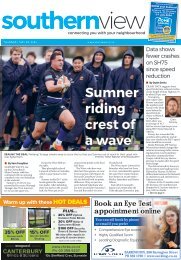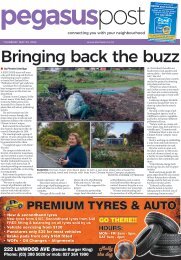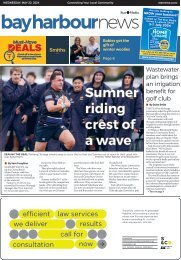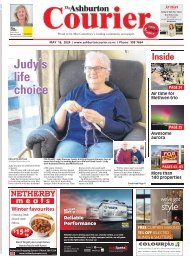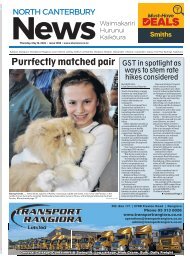Western News: July 29, 2021
Create successful ePaper yourself
Turn your PDF publications into a flip-book with our unique Google optimized e-Paper software.
WESTERN NEWS Latest Canterbury news at starnews.co.nz<br />
Thursday <strong>July</strong> <strong>29</strong> <strong>2021</strong> 7<br />
Willowbank a constantly moving feast<br />
Nick Ackroyd has been<br />
looking after keas and<br />
other native species<br />
at Willowbank for the<br />
past 12 years. He talks<br />
to reporter Fiona Ellis<br />
LOKI, BLOFELD, Moriarty<br />
– these are just some of the<br />
names of Willowbank Wildlife<br />
Reserve’s 15 keas.<br />
While the birds may not have<br />
the villainous personalities of<br />
their namesakes, their mischievousness<br />
makes them popular<br />
animals with native species<br />
keeper Nick Ackroyd.<br />
“Probably my favourite, that I<br />
look after every day, is the group<br />
of kea that we have here at Willowbank,”<br />
the St Albans resident<br />
said.<br />
“They . . . are a bit crazy, so<br />
that’s great fun.”<br />
In spite of working in the role<br />
for 12 years, the birds had never<br />
managed to snatch any items<br />
from him, but had been known<br />
to pilfer pompoms, cash and<br />
even credit cards from unwary<br />
visitors.<br />
Kea were as intelligent as great<br />
apes and could solve puzzles that<br />
stumped chimpanzees, he said.<br />
His aim was not to domesticate<br />
animals, but rather to keep<br />
them as wild as possible.<br />
“I think people assume there’s<br />
a lot of cuddling of animals and<br />
patting of things and playing<br />
with stuff. When you’re a zookeeper,<br />
you’re kind of doing the<br />
opposite thing.<br />
“I don’t want them to be playing<br />
with me, I want them to be<br />
going and socialising with the<br />
other animals.”<br />
Not interacting with other<br />
animals could also make them<br />
direct their aggression towards<br />
humans, he said.<br />
This was the case with a<br />
paradise shelduck who had been<br />
hand raised.<br />
“He doesn’t like us and tries to<br />
chase us away whenever we go<br />
into his enclosure.”<br />
Other animals were also in his<br />
charge, from birds such as takahe,<br />
kaka, and whio, to tuatara<br />
and more threatening species.<br />
“We also have a ferret and a<br />
pig and a possum so that people<br />
can see those animals that are<br />
present in New Zealand as well,<br />
and they’re the ones that are<br />
causing issues for our native<br />
animals.”<br />
Conservation efforts were an<br />
important part of Willowbank’s<br />
role, and it was rewarding for<br />
him to play his part in working<br />
towards the Department of Conservation’s<br />
Predator Free 2050<br />
plan, he said.<br />
Although he was concerned<br />
about the future of New Zealand’s<br />
wildlife, there were also<br />
bright points to focus on.<br />
Takahe were doing well and<br />
their numbers increasing, he<br />
said.<br />
Willowbank received two new<br />
takehe from Te Anau earlier<br />
this month as part of a recovery<br />
programme by DOC and Fulton<br />
Hogan.<br />
“Those birds are really<br />
important, they’re genetically<br />
quite unique and we’re hoping<br />
to breed some young from them<br />
this year.”<br />
Signs they would hit it off<br />
come breeding season were<br />
promising, as the pair were<br />
“hanging out” rather than fighting,<br />
he said.<br />
The programme aimed to<br />
breed and release takahe, as Willowbank<br />
had done with other<br />
birds, such as the kaka in Abel<br />
Tasman National Park.<br />
It was always exciting to work<br />
with DOC to do releases, Ackroyd<br />
said.<br />
People’s interest in Willowbank<br />
and learning about native<br />
wildlife was also encouraging,<br />
from strangers to his own children.<br />
“I’ve got two kids who have<br />
both come through here heaps of<br />
times and they love it too.”<br />
However, his favourite aspect<br />
SKILFUL:<br />
Moriarty<br />
looking for<br />
something<br />
to get his<br />
beak into.<br />
of the job was working with likeminded<br />
people.<br />
“We all love working with<br />
animals and want to really make<br />
a difference in that conservation/<br />
native animal area.”<br />
This made up for the less appealing<br />
aspects of the job, such<br />
as working through wicked early<br />
morning frosts, chopping up<br />
chicken to feed the ferret.<br />
People would be surprised at<br />
how much of his role involved<br />
preparing food for the animals<br />
and cleaning their dishes, he<br />
said.<br />
“There are lots more cleaning<br />
and tidying jobs than you might<br />
expect.”<br />
As a child, he would not have<br />
FEATHERED FRIENDS:<br />
Willowbank Wildlife<br />
Reserve native species<br />
keeper Nick Ackroyd is<br />
careful not to have any<br />
potentially pinchable items<br />
on him as he drops in on<br />
his favourite charges, the<br />
keas.<br />
PHOTOS: GEOFF SLOAN<br />
expected to find himself in this<br />
job, in spite of his interest in<br />
animals, he said.<br />
“My zoo keeping career started<br />
a little bit sideways. I trained to<br />
be a teacher and I did a zooology<br />
degree, but I didn’t really want to<br />
work as a teacher.”<br />
Instead, he took on a job tour<br />
guiding at Kelly Tarlton’s Sea<br />
Life Aquarium, which proved<br />
to be a foot in the door of an<br />
animal keeping career.<br />
He was pleased to work mostly<br />
with birds now.<br />
“Mammals are a bit smelly and<br />
difficult, whereas birds are lovely.<br />
“It’s like a constantly moving<br />
feast, Willowbank. There’s<br />
always something new here.”


